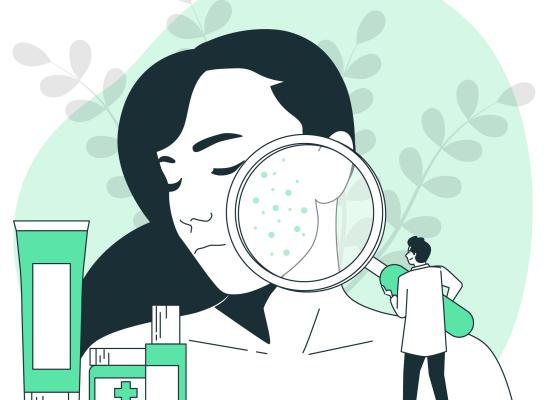Expressive Writing and Skin Picking: Can Writing It Out Help?

Online test
Find out the severity of your symptoms with this free online test
Ask anyone who writes or journals why they do it, and you’re probably going to get an answer something like, “I feel better when I do it.” For centuries, people have used expressive forms of writing as a way to explore their thoughts, feelings, and ideas. People often describe this act of self-expression and exploration as cathartic, enlightening, and even healing. While writing can take on many forms, a form known as expressive writing has been found to be particularly beneficial for one’s health and mental health. Some research suggests that it might even be helpful for people living with skin picking disorder and other body focused repetitive behaviors (BFRBs).
What Is Expressive Writing?
Expressive writing is a form of therapeutic writing in which a person writes about their thoughts and feelings related to a particular stressful or traumatic experience or situation. This type of writing is sometimes referred to as “written disclosure” because the person is writing about personal information, thoughts, and feelings. The style of expressive writing is personal, unstructured, and free flowing, without regard for writing conventions like style, spelling, punctuation, or grammar. The result is uniquely individual.
This form of writing has been shown to have a number of physical and emotional benefits including:
- Improved mood and sense of well-being
- Decreased depression and avoidance symptoms
- Lower levels of stress and anxiety
- Decreased blood pressure
- Fewer doctor visits
- Better immune function
Expressive writing is more than just journaling. The focus is more on the person’s emotional experiences and less about people, places, situations, or things. Just how expressive writing works isn’t entirely clear. However, it is thought to enhance emotional and cognitive processing that may result in greater clarity, insight, and problem-solving skills. It may also aid in disinhibition (catharsis), self-regulation, social integration, and acceptance of the negative experience. It appears writing in this way provides a safe space to process difficult emotions and experiences.
Skin Picking and Emotional Regulation
While the exact cause of skin picking is unknown, it is thought to occur in response to negative or uncomfortable emotions as an attempt to avoid, reduce or regulate them. When a person is distressed and experiences these unpleasant emotions, picking becomes a way to alleviate those emotions, at least temporarily. People who pick often report feelings of relief or satisfaction following a picking episode. In this way, skin picking is thought to be a form of emotional regulation.
Treatment options for skin picking have generally consisted of behavioral interventions, most notably Habit Reversal Training (HRT). While HRT addresses the behavioral aspects of skin picking, it does not address the cognitive/emotional factors and there has been increased interest in finding adaptive strategies that also address the emotional component to skin picking.
There is some evidence that cognitively-focused strategies like cognitive reappraisal may reduce skin picking. Cognitive reappraisal is essentially re-thinking or re-evaluating how you think about a situation. It’s like taking a step back and trying to view it in a different way rather. By changing how you think about something, you can change the emotional experience and how you react. People who used cognitive appraisal more often tended to report lower levels of skin picking severity.
Can Expressive Writing Reduce Skin Picking?
Expressive writing has shown positive outcomes for other mental health issues. Researchers recently explored effects of expressive writing interventions for people with skin picking disorder.
The study authors hypothesized that expressive writing would result in greater emotional regulation skills. They also suggested that expressive writing may also offer an additional benefit: stimulus control. Stimulus control is one of the primary components of HRT. The act of writing (either by hand or by computer) becomes a competing response making it difficult to pick and write at the same time. Expressive writing offers a sort of stimulus control by minimizing the opportunity for skin picking. They also suggested that writing with a pen or pencil in particular may have an added benefit of being a replacement behavior for skin picking, citing previous evidence that supports the use of sketching.
Results showed that expressive writing produced positive short-term and mid-term effects on skin-picking behavior:
- Participants in the expressive writing group reported decreased urges to pick both immediately after each writing session and at the conclusion of the study. Participants in the control group also reported decreased urges although to a lesser degree.
- Participants in the expressive writing group reported greater decreases in tension and enhanced feelings of relief than the control group.
- Findings did not support the hypothesis that manually writing may be a “replacement” behavior for skin picking. There was no significant difference between the writing modalities (pencil/pen vs computer) on reduction of picking symptoms.
The findings of this study suggest that expressive writing may be a useful strategy for helping people with skin picking disorder to learn more adaptive emotional regulation skills.
The Takeaway
While expressive writing is not a stand-alone treatment, studies like this one suggest that writing and other creative therapies have a place at the treatment table. Writing can be a non-intrusive, comfortable option for exploring deeper thoughts and feelings, especially when talking it out may be difficult. It offers the advantage of being convenient, private, and can be done on one’s own time. Writers can later reflect on what they’ve written offering the opportunity for insight. While more research is needed, expressive writing may be useful as part of a comprehensive treatment approach.
References
1. Schlintl, C., & Schienle, A. (2023). Reduction of Pathological Skin-Picking Via Expressive Writing: A Randomized Controlled Trial. Clinical Psychology in Europe, 5(2), 1-18. https://cpe.psychopen.eu/index.php/cpe/article/view/11215
2. Lepore, S.J., Kliewer, W. (2013). Expressive Writing and Health. In: Gellman, M.D., Turner, J.R. (eds) Encyclopedia of Behavioral Medicine. Springer, New York, NY. https://link.springer.com/referenceworkentry/10.1007/978-1-4419-1005-9_1225
3. Frattaroli, J. (2006). Experimental disclosure and its moderators: A meta-analysis. Psychological Bulletin, 132(6), 823–865. https://psycnet.apa.org/doiLanding?doi=10.1037%2F0033-2909.132.6.823
4. Schienle, A., & Wabnegger, A. (2020). Two subtypes of pathological skin-picking: Evidence from a voxel-based morphometry study. Journal of Obsessive-Compulsive and Related Disorders, 25, 100534. https://www.sciencedirect.com/science/article/pii/S2211364920300555?via%3Dihub
5. Prochwicz, K., Kłosowska, J., & Kałużna-Wielobób, A. (2018). The relationship between emotion regulation strategies, personality traits and skin picking behaviours in a non-clinical sample of Polish adults. Psychiatry Research, 264, 67-75. https://www.sciencedirect.com/science/article/abs/pii/S0165178117319698?via%3Dihub
6. Atkin, L. (2017, November). Re-imagining compulsive skin picking: Art for recovery [Video]. Ted Conferences. https://www.ted.com/talks/liz_atkin_re_imagining_compulsive_skin_picking_art_for_recovery
Online test
Find out the severity of your symptoms with this free online test
Start your journey with SkinPick
Take control of your life and find freedom from skin picking through professional therapy and evidence-based behavioral techniques.
Start Now



